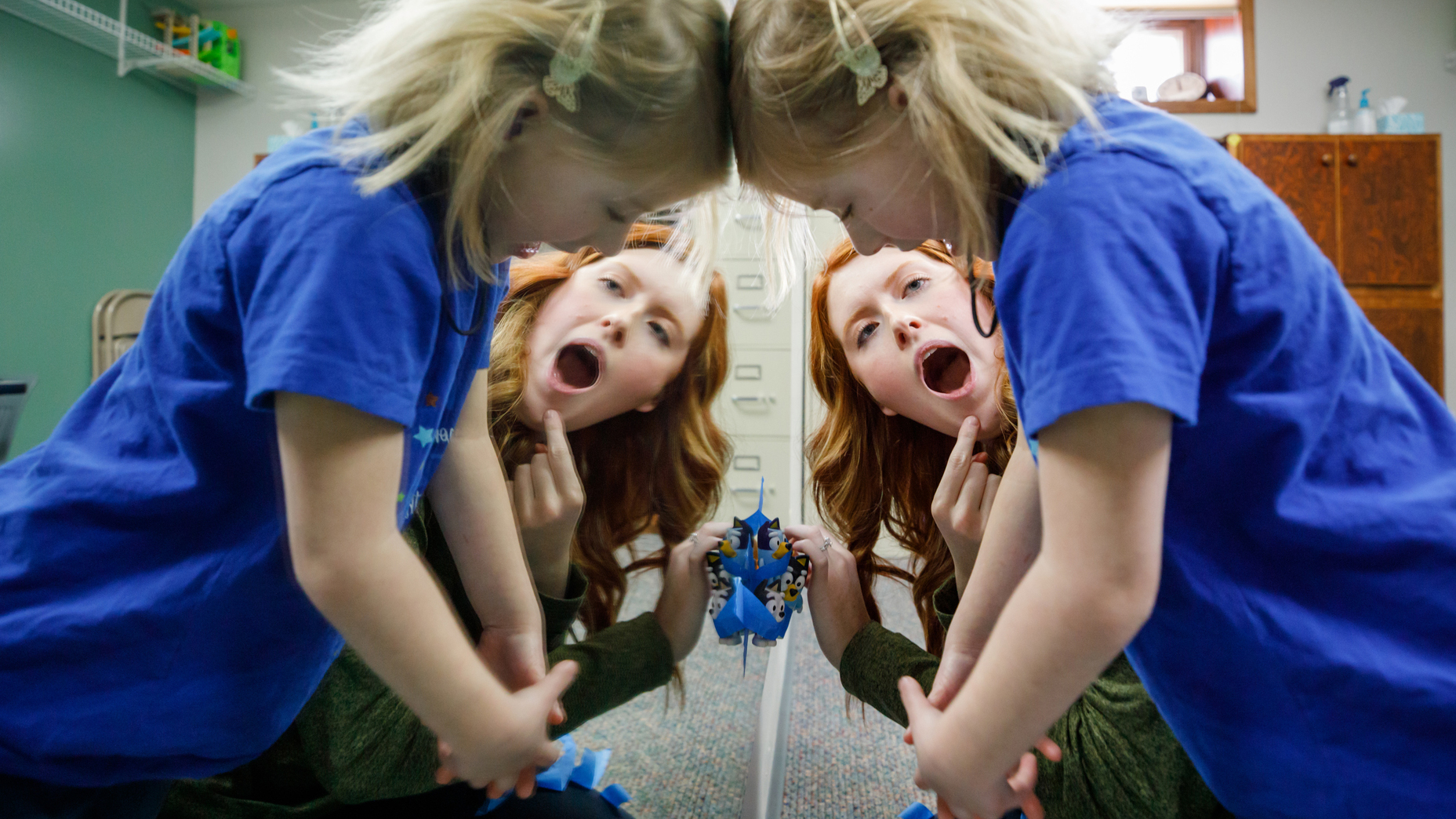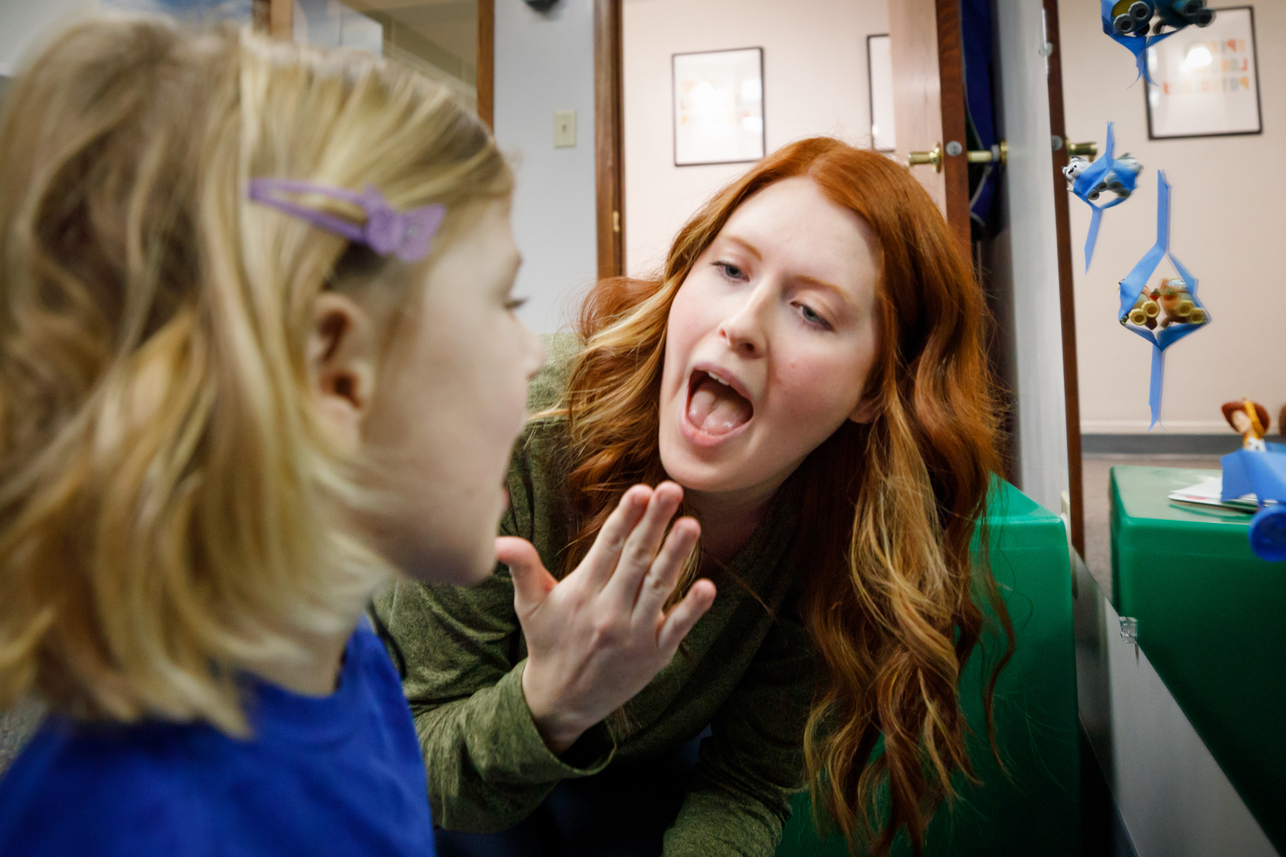Each spoken word is a triumph when childhood apraxia traps them inside.
The UNMC Munroe-Meyer Institute’s RiteCare Clinic in Hastings is teaching a 5-year-old girl the speech skills to match her outgoing personality – and highlighting the importance of that therapy to central and western Nebraska.
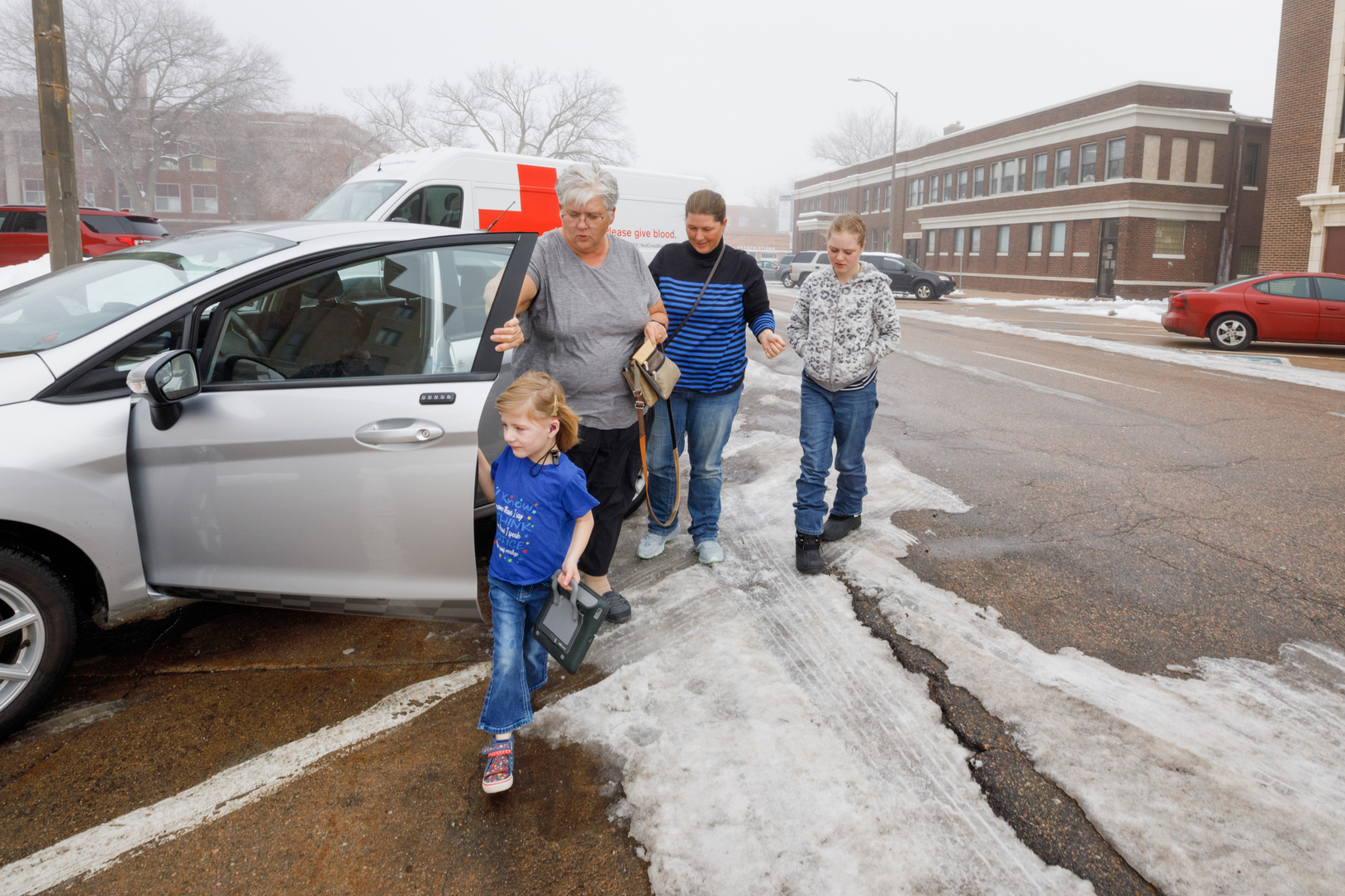
Five-year-old Hannah Buntin rushes from the family vehicle to greet her speech therapist at the UNMC Munroe-Meyer Institute’s RiteCare Clinic in Hastings, Nebraska. With her are her grandmother, mom and older sister.
Hannah Buntin arrives in Hastings, all smiles and energy.
She’s got her voice communicator in hand from the car ride – the one she keeps pressing on repeat to express her excitement at going to see the speech therapist she loves.
“Sydney. Sydney. Sydney.”
Hannah is an outgoing 5-year-old, a bubbly kid whose brightness lights up the world around her – but also a young girl whose voice is too often trapped inside her. She has Childhood Apraxia of Speech, a neurological speech disorder in which her brain struggles to create motor plans for speech and can mask Hannah as a quiet kid she’s not.
Hannah’s attitude can’t be contained when she flashes her bright smile and walks with a bop in her step. But her speech can.
It’s all inside the little ball of sunshine. Now, the task is to bring it out.
She came 250 miles from Ashby in Nebraska's Sandhills to Hastings one wintery Tuesday to press toward the goal everyone has rallied around: Finding Hannah’s voice.
This is the place where it’s happening – the Munroe-Meyer Institute’s RiteCare Clinic.
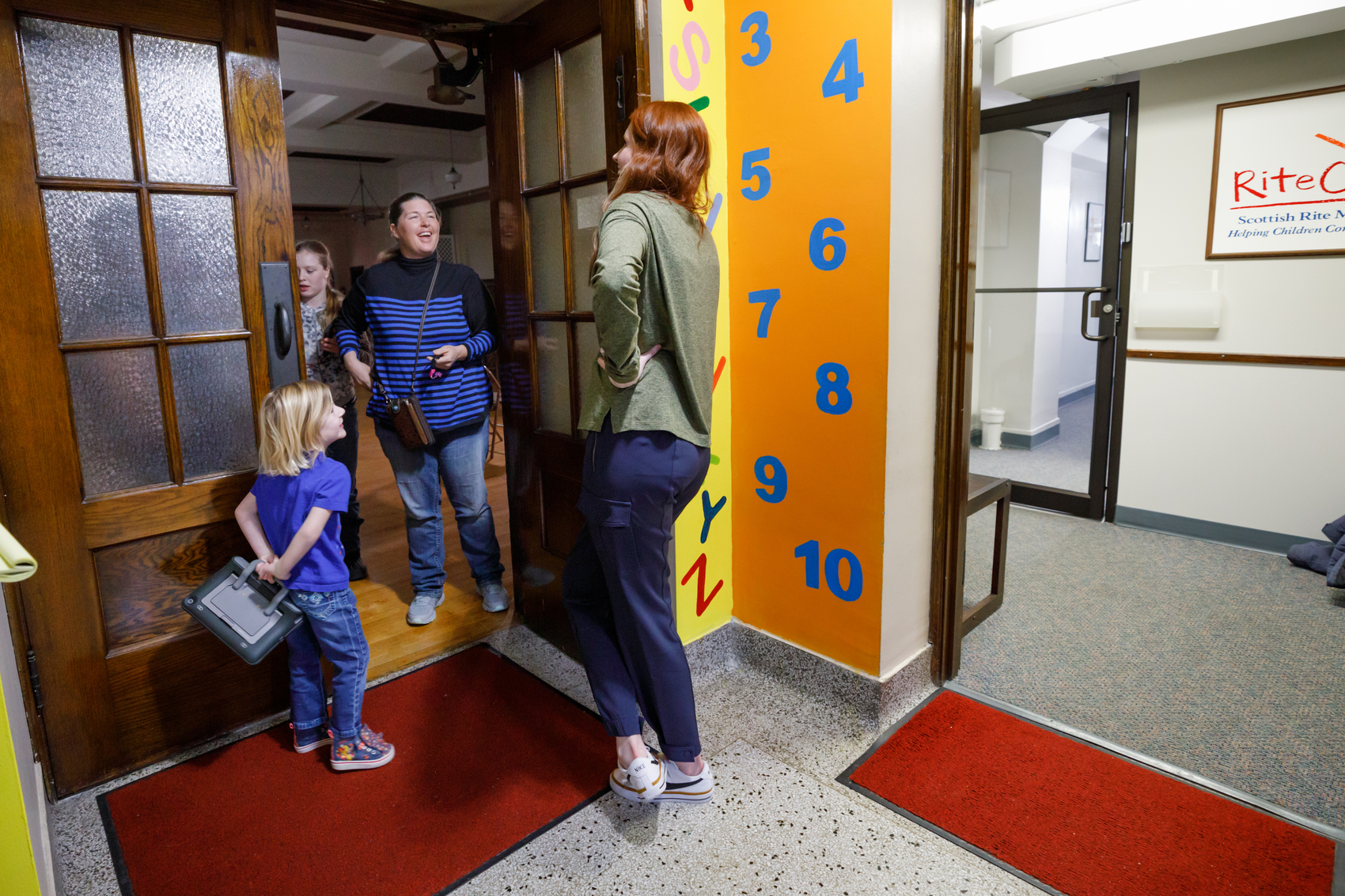
Hannah's eyes light up whenever she encounters her speech therapist, Sydney Norton. The chemistry between them is helping Hannah become stronger in the basics of speech with each therapy session.
The Buntin family's journey started at 2 a.m. this day. So Hannah is raring to go when her grandmother’s silver Ford Fiesta arrives at the clinic.
Today, Hannah’s favorite blue T-shirt sprinkled with colorful stars says it all. It might as well be her motto:
I know
more than I say
I think
more than I speak
I notice
more than you realize
Hannah communicates a lot – it just comes out in different ways.
She knows more about operating her touchscreen communicator than the adults who come across it. She mixes in sign language. Hannah has mastered the skill of flashing her smile to express what she’s thinking.
The spoken words are coming out more and more, too.
This morning, when the family stopped at a Hy-Vee grocery store on the way to Hastings, Hannah dropped a casual “excuse me” and “dirty” – both new words for her.
“Sydney” on Hannah’s communicator is Sydney Norton, one of two speech-language pathologists at the clinic.
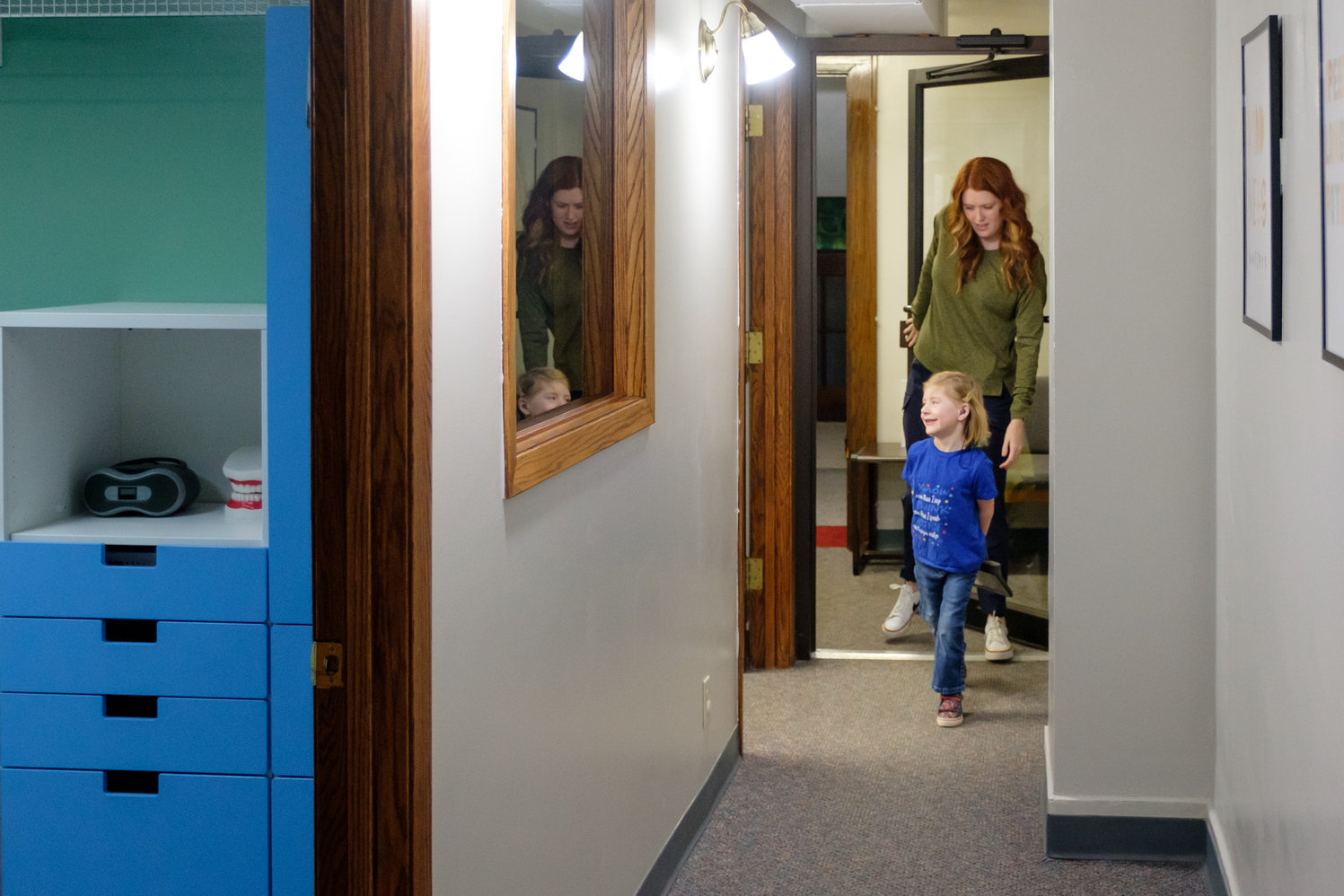
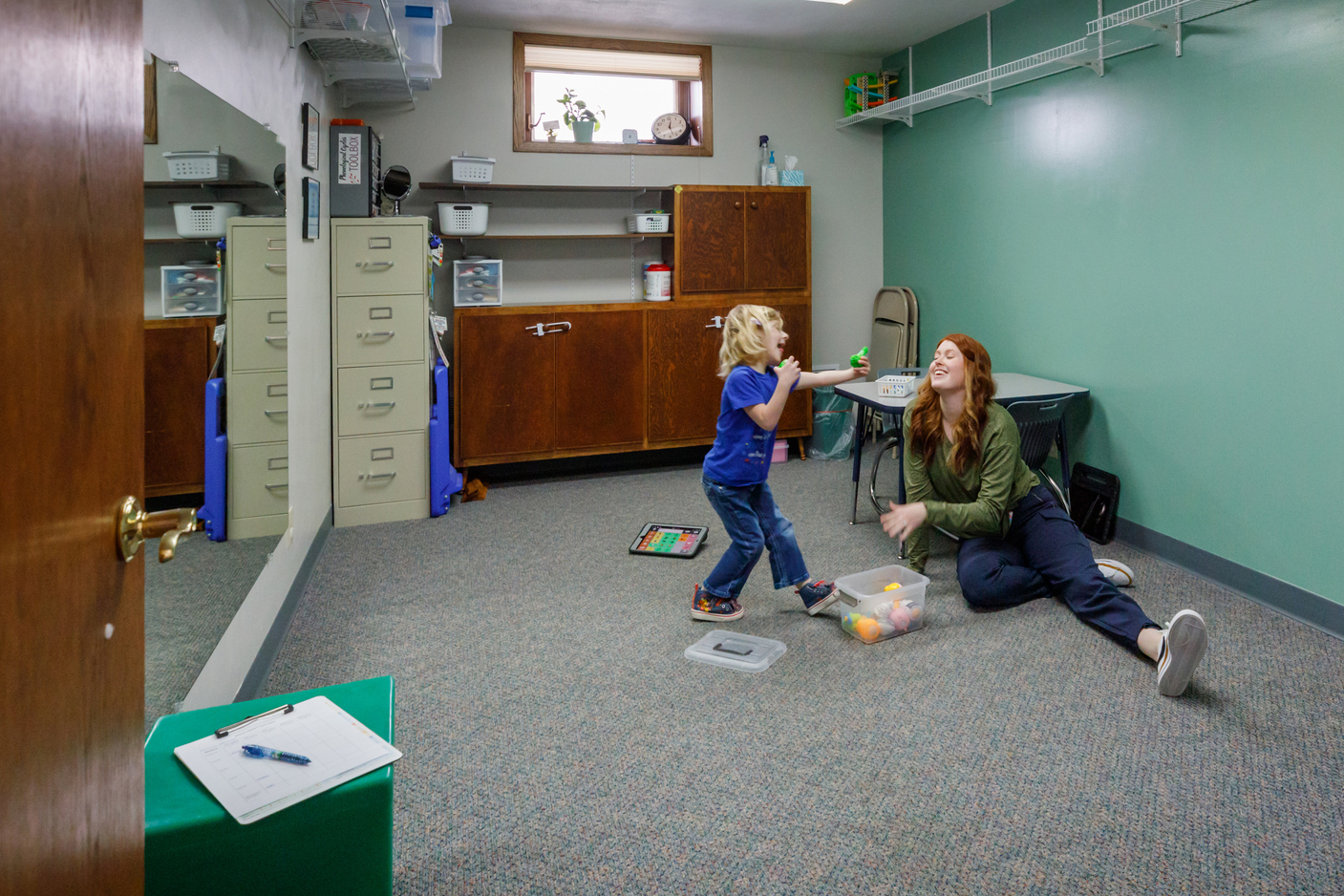
Sydney Norton and Hannah head into a therapy room of the pediatric clinic in the lower level of the Hastings Masonic Temple. For the next hour, the two will work on some new words for Hannah.
When they get to the clinic’s door, Norton steps out to greet Hannah and her family – grandmother Caleta Lewis, mom Ame Buntin and sister Ashly. And Hannah loves it.
Today, Norton has something special planned for Hannah – an exercise with Bluey, a cartoon character that Hannah adores.
Hannah’s voice can’t be contained any more. No communicator. No sign language. No unspoken cues.
Hannah speaks.
“Whaaaat!?!”
It’s time to find Hannah’s voice.
"It's everything for someone to have a voice."
Hannah and her family may have a long journey, some four hours, to get to Hastings. But it’s a trip they gladly make every Tuesday.
The clinic is located inside the Hastings Masonic Temple, a municipal-looking building that greets visitors with RiteCare’s message once inside. Colorful wall paintings of animals and nature scenes draw people downstairs to the pediatric clinic.
It’s a humble space – a small front office with desks for Norton and fellow speech-language pathologist Krislyn Althouse and two therapy rooms.
“Do you see Miss Sydney?” mom Ame asks Hannah.
“You get excited for your Tuesdays, don’t you?”
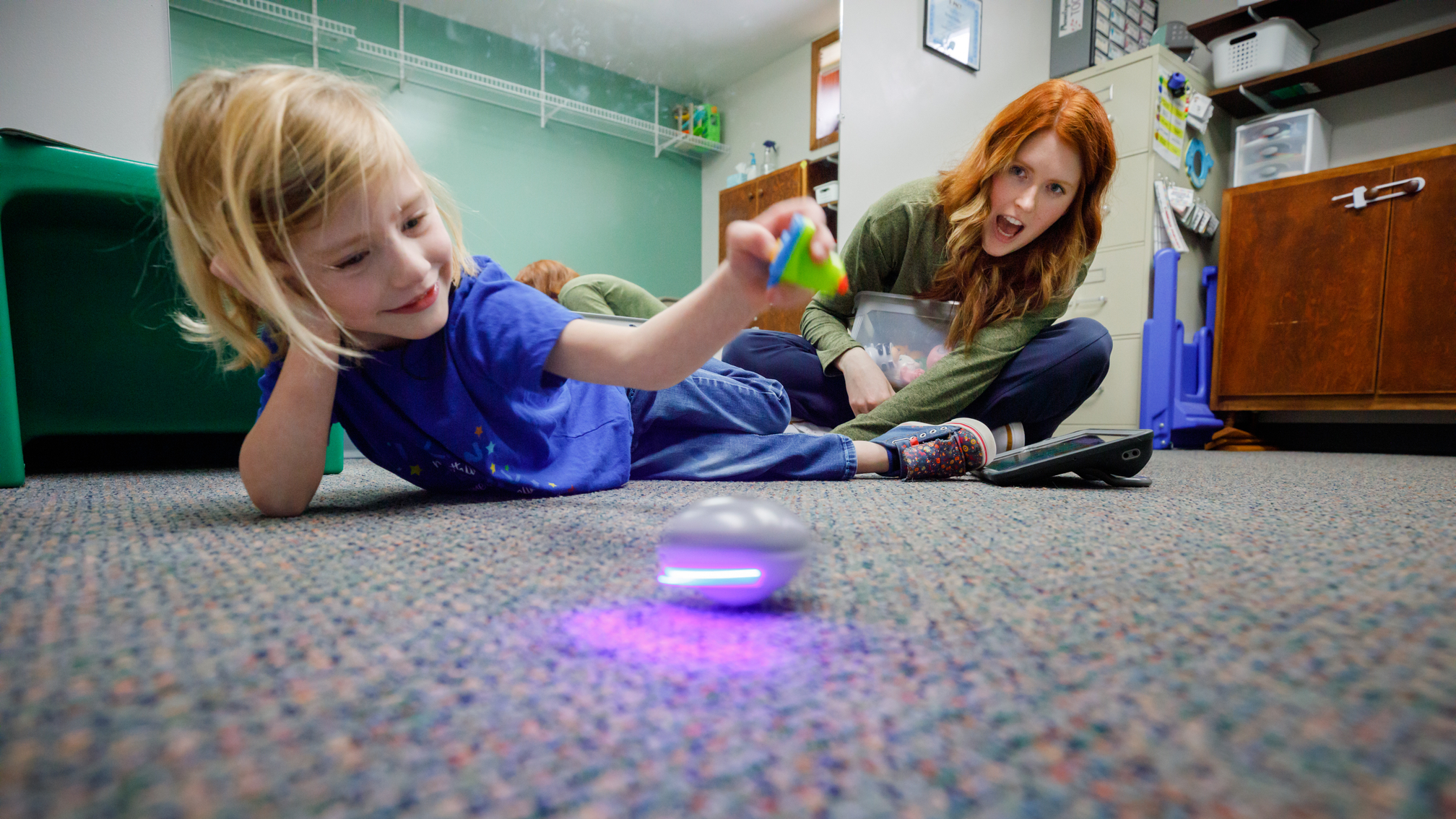
Play is an integral part of Hannah's intensive therapy. A spinning toy is a reward at the close of a good day.
Norton, part of the department of speech-language pathology at the Munroe-Meyer Institute, has been recognized for the care she offers at the RiteCare Clinic. She started her career working in rehab with nursing homes but joined MMI in 2019 after deciding she wanted to work with children.
For MMI and RiteCare, Norton works with kids with severe speech disorders, often children diagnosed with autism. She brings a love for augmentative and alternative communication, like Hannah’s touchscreen communicator.
Norton diagnosed Hannah last spring after the Buntins had met frustration elsewhere throughout Hannah’s young life. Norton offered the game plan for Hannah’s care – one visit to Hastings per week and two virtual sessions to train Hannah in the basics of speech.
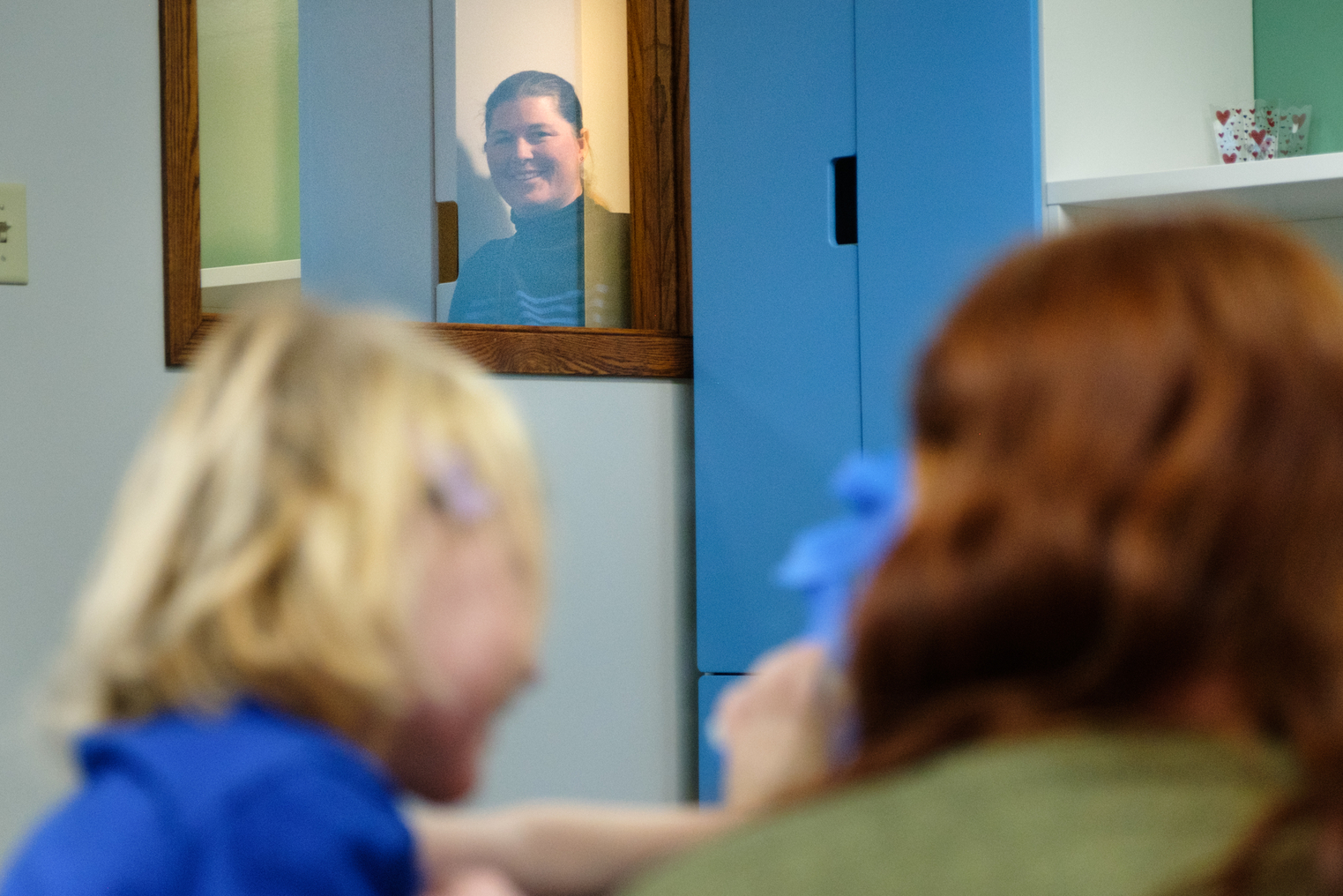
Ame Buntin watches through the glass as her daughter embraces her therapy session.
On the surface, Norton plays with Hannah throughout her appointment. But it’s also an intense, tiring speech therapy session.
Today, Norton will use blue tape to stick toy figures, including Bluey, on a mirror wall in the therapy room. If Hannah follows direction – and sounds out the words correctly and completely – she can take down the toys from the wall.
Norton gets down on the floor at eye level with Hannah so the little one can see every vocal movement and facial stretch, and the mirror is there to offer a complete view. To overcome Hannah’s apraxia, Norton is teaching her brain the very mechanics of speech, the physical moves to sound out a word.
Woody and Buzz Lightyear are two of the toys taped up. And they need to get …
“Out,” Norton directs Hannah.
“Ou,” Hannah tries, with only part of the word.
Norton urges her on, “Put your end on.”
Hannah understands.
“OuT,” she says, punctuating the “T”. “OuT.”
Before long, the words are out, and the mirror wall is clear.
Norton cheers on Hannah, “Look, our basket is full!” So, then the toys need to …
“Goooo up,” Norton says.
Hannah follows. “Go up.”
“Tell me again,” Norton says.
“Up. Up.”
Hannah is talking.
In the hallway right outside, mom Ame is touched.
“I just want to cry because we’re getting somewhere,” she said.
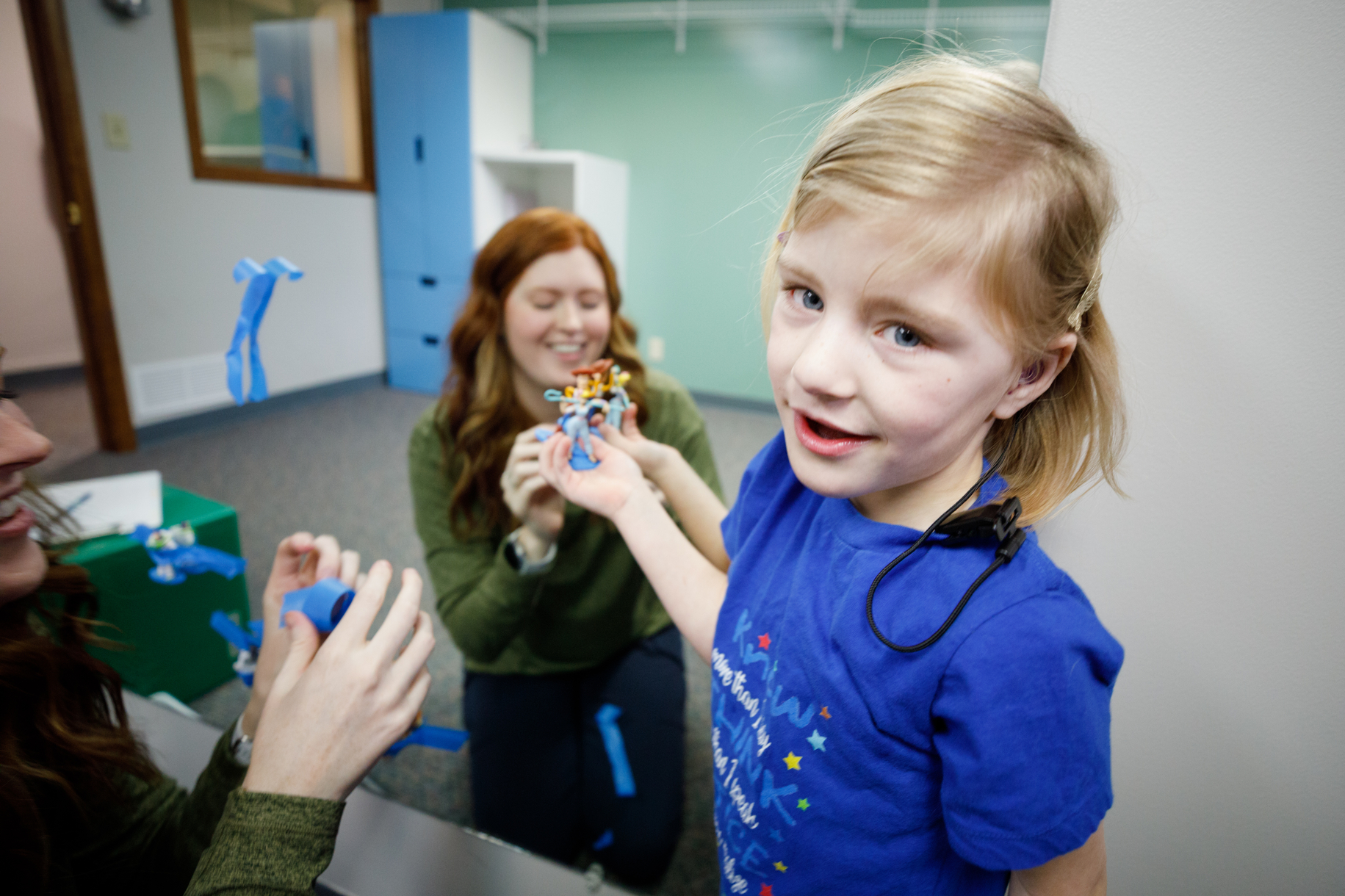
Hannah's condition wasn't diagnosed until the Buntin family received a referral from a stranger with first-hand knowledge of MMI's RiteCare Clinic in Hastings. It's supported through the Scottish Rite Masons of Nebraska.
Hannah and her family have had a difficult journey to get here.
Until they started at RiteCare last April, the Buntins had no diagnosis, no answers, no plan to help Hannah, grandmother Caleta Lewis said.
From the very first test after she was born, Hannah failed her hearing exams – and her speech lagged.
All along the way, Lewis said, the family received assurances about the failed tests. That’s normal after a C-section, they were told, or it’s because of fluid in her ears. Over and over, they were reassured, Hannah was not deaf and even had normal hearing in her right ear, Lewis said.
But Hannah’s voice wasn’t coming out.
After early speech therapy, a hearing aid and regular appointments at a clinic in Omaha, Hannah spoke only about 10 words, and fewer than that reliably. With kindergarten fast approaching, Buntin and her mom cried after one last appointment.
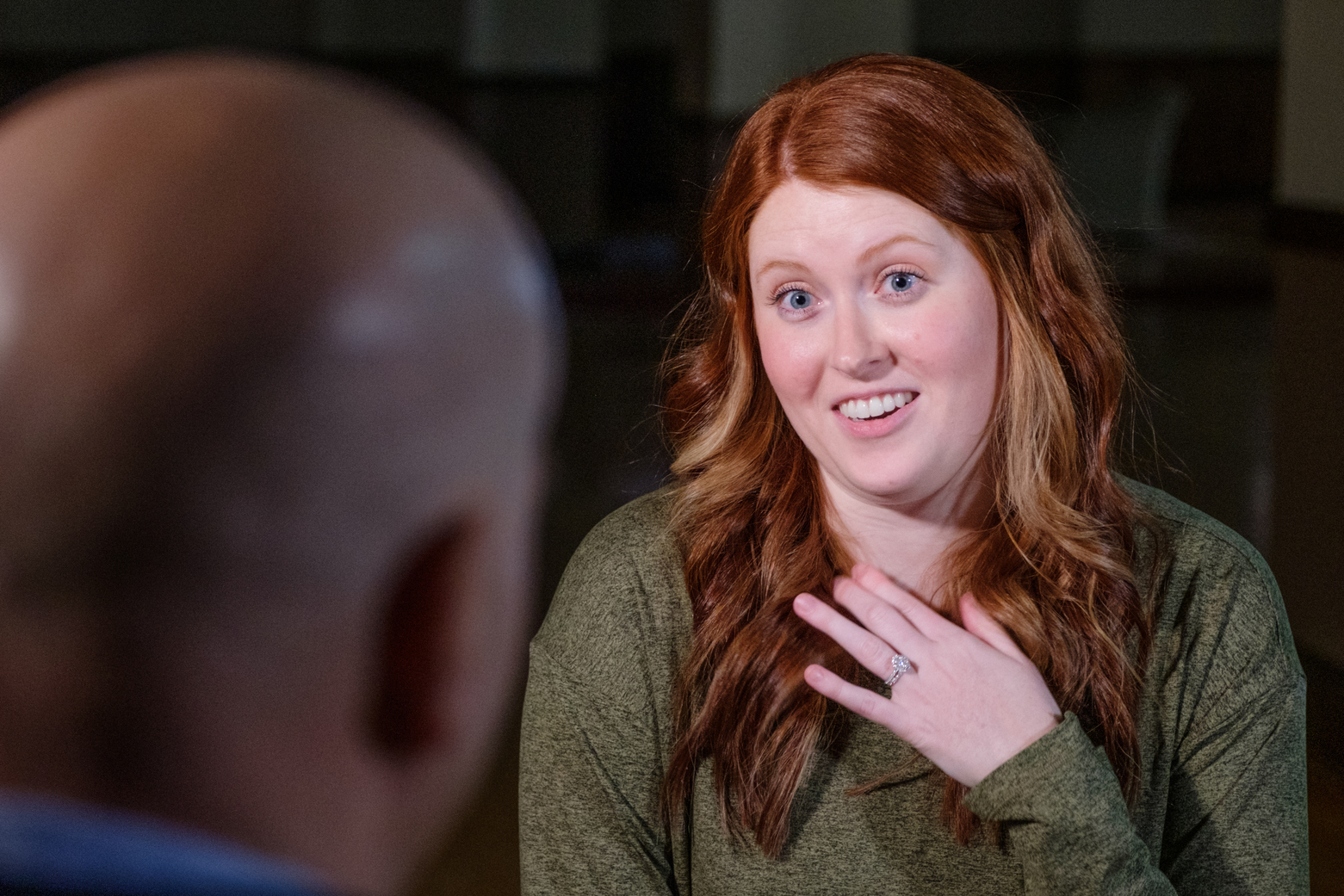
"Hannah has always had a voice. It's just been trapped inside," says speech therapist Sydney Norton.
On the trip across Nebraska back to Ashby on that day last April, the family stopped in Grand Island at a Sam’s Club for groceries, Lewis recalls.
As they walked through the aisles, they talked with Hannah using sign language, Lewis said. In the crowd of customers, a man who knew sign language noticed and stopped to meet the family.
He signed with Hannah and asked Buntin and Lewis if she was deaf.
Lewis recalls telling him that Hannah has normal hearing in one ear and a hearing aid for the other. Her issue is speech, she said.
“Oh, she has apraxia,” the man said.
All this time, Lewis said, the Buntins had never heard a full explanation of Childhood Apraxia of Speech, sometimes called CAS or verbal apraxia. Nor had they received that diagnosis for Hannah.
The visitor in Sam’s Club told them he helped raise money for the Scottish Rite Masons and the RiteCare clinic they support in Hastings, Lewis said. He wrote down the contact information, she said, and moved along.
That was Hannah’s first angel, as the family calls him now.
They consider Sydney Norton their second.
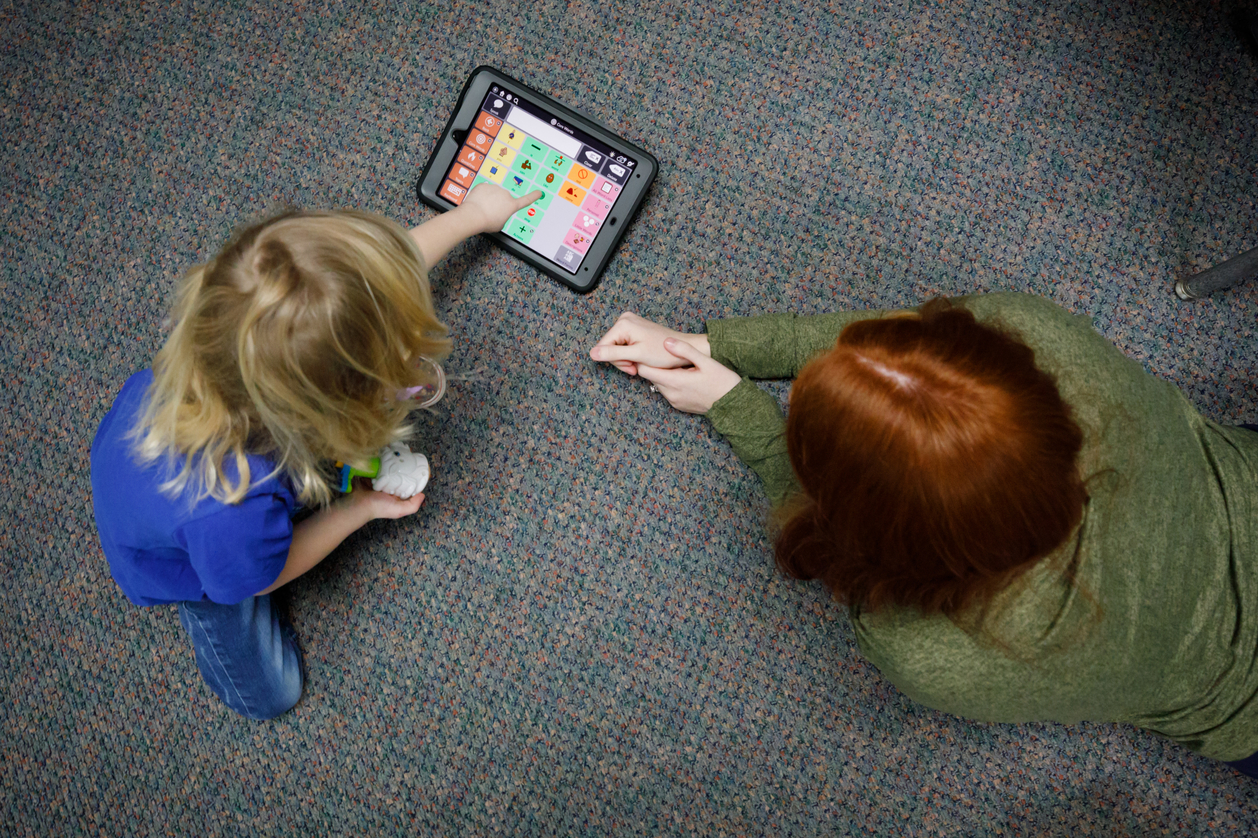
Hannah uses a touch-pad communication device to augment conversations with others, including her therapist.
Norton grew up in Hastings and said it’s an honor to serve the community.
“I know the people. I know the community. I know the culture,” she said. “And it’s just a great honor that they trust me with their children, especially with their children who are in such a time of crisis in their lives.”
Norton knows the special importance of the RiteCare Clinic to Hastings and the broader community in outstate Nebraska.
Started in 1976, the clinic operates through MMI in partnership with the Scottish Rite Masons of Nebraska to provide pediatric speech and language therapy services. Thanks to the Masons’ fundraising, families whose children get therapy there receive no bill.
The clinic represents one example of MMI’s outreach across Nebraska – part of the hub and spokes of services that reach out to the state from the Munroe-Meyer Institute’s main facility in central Omaha.
Norton calls the clinic “small but mighty.”
Many families in the region drive hours to access the Hastings RiteCare Clinic’s services, Norton said. Even though the services are so vital for the clinic's clients, she said, it’s not feasible for those families to drive all the way to Omaha or Lincoln for regular appointments.
“It means everything to our area,” she said. “Having an option here in central Nebraska just opens the door for all of these people.”
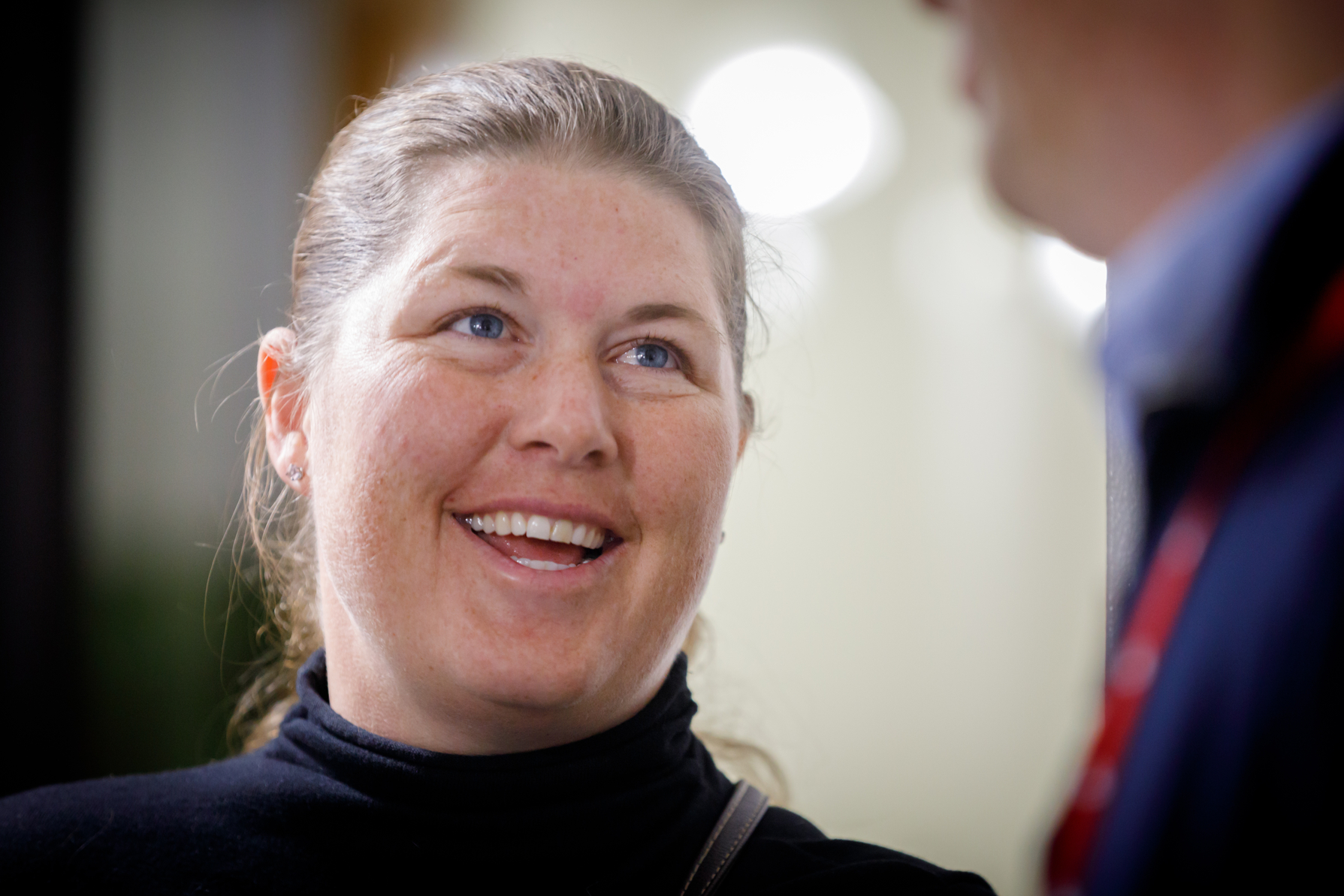
Ame Buntin calls MMI's RiteCare Center a godsend for not just her daughter but the entire family. Between trips to Hastings, they re-enforce what Hannah is learning and check in with Norton via video chats.
Having seen – and heard – Hannahs’ progress, the Buntins believe the road ahead has opened for Hannah.
The words are adding up, and becoming phrases. Hannah speaks some “ghost words” – words that Hannah hadn’t practiced before that just come out but maybe don’t become regulars.
Norton said she knew from the moment she met Hannah that she would need to “be on my A-game to get this kiddo some help.” Norton said she’s proud to see Hannah’s progress and grateful to be part of her journey.
“She’s come an extremely long way,” Norton said.
Hannah is happier now because people can understand her, her mom said. The outgoing young girl can go up to other kids – and not get strange looks when she doesn’t talk.
Buntin said she considers RiteCare and MMI a blessing from God.
“Sydney has opened several doors for us. Hannah’s just blooming – just blooming so much.”
The hope is that Hannah’s speaking skills keep growing, either through the RiteCare Clinic or a classroom or in her everyday life. In addition to her other therapy, Norton has taught Hannah’s family direct therapy skills to carry on the learning at home.
Back at her grandma’s house, Hannah often will sneak behind grandma’s couch. In hiding, she’ll practice the words she’s been learning.
Hannah is finding her voice. She’s learning the tools to use it.
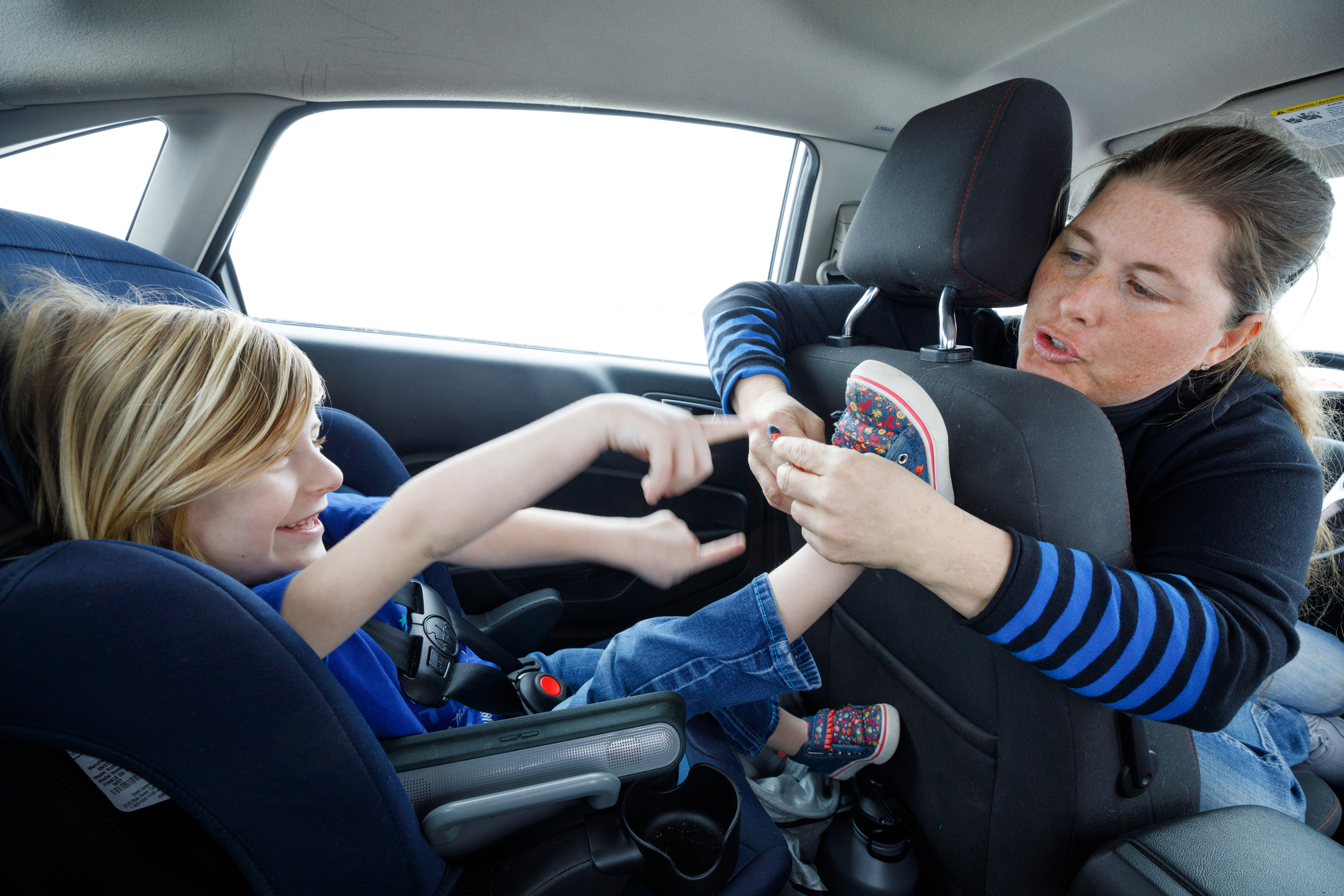
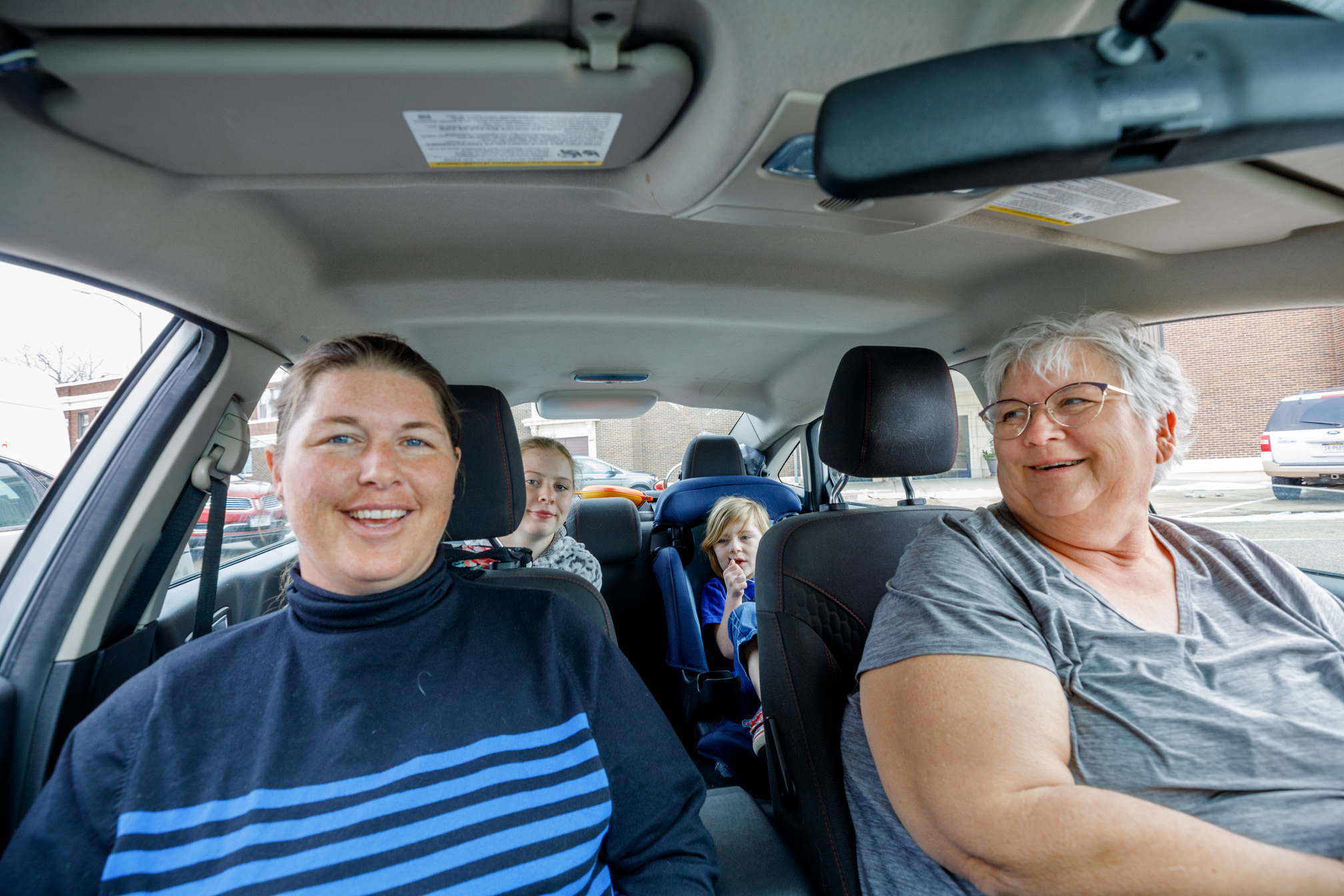
The Buntin family travels 500 miles round-trip each week so that Hannah can have one-on-one speech therapy at MMI's RiteCare Clinic. The progress that Ame Buntin sees in her daughter makes every mile worthwhile.
